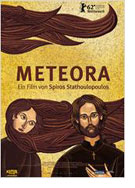

Opening 12 Jun 2014
Directed by:
Spiros Stathoulopoulos
Writing credits:
Asimakis Alfa Pagidas, Spiros Stathoulopoulos
Principal actors:
Theo Alexander, Tamila Koulieva-Karantinaki, Giorgos Karakantas, Dimitris Hristidis, Stelios Mavroudakos
A monk and a nun succumb to a common human sitaution: they fall in love. This is not the only unusual feature in their relationship. Theodoros is a Greek monk in the monastery of Meteora. Urania is a Russian nun in the convent across the way. These ancient buildings go back to pre-13th century and are located at the highest point on a mountain in Thessaly in Greece. They face each other across a deep, deep divide, so that any kind of rendezvous requires a huge amount of imagination. Theodoros can walk up and down long mile-long steep steps. But Urania can only be lowered out a window in a basket. All of the nuns go about their business, e.g., buying groceries, in this way. It is impossible to sneak in and out of the convent. Still Theodoros and Urania communicate; they flash sunlight reflections into their rooms, which are opposite each other across the chasm.
The love story is simple, but the film location is amazing. Meteora actually exists and is the destination of many determined tourists. It has a long and ancient history, which is evident in the film. We see monks in traditional garb, icons and paintings. Film music consists of chants and drum rhythms from the church services. There are sequences of animated scenes of icons, which represent the thoughts and feelings of the characters. Meteora means “hovering in the air,” and director Spiros Stathoulopoulos said that often the clouds passed under Meteora, which made it look as if it were, in fact, floating above earth. This is 80 minutes of pure pleasure, just the photography is enough reason to buy a ticket. How did a film team schlepp its equipment to the top? This played at the 2012 Berlinale, and you should have no trouble understanding and enjoying it, no matter whether it is in Greek or German, as there is very little text, usually quotes from the Bible. (Becky Tan)